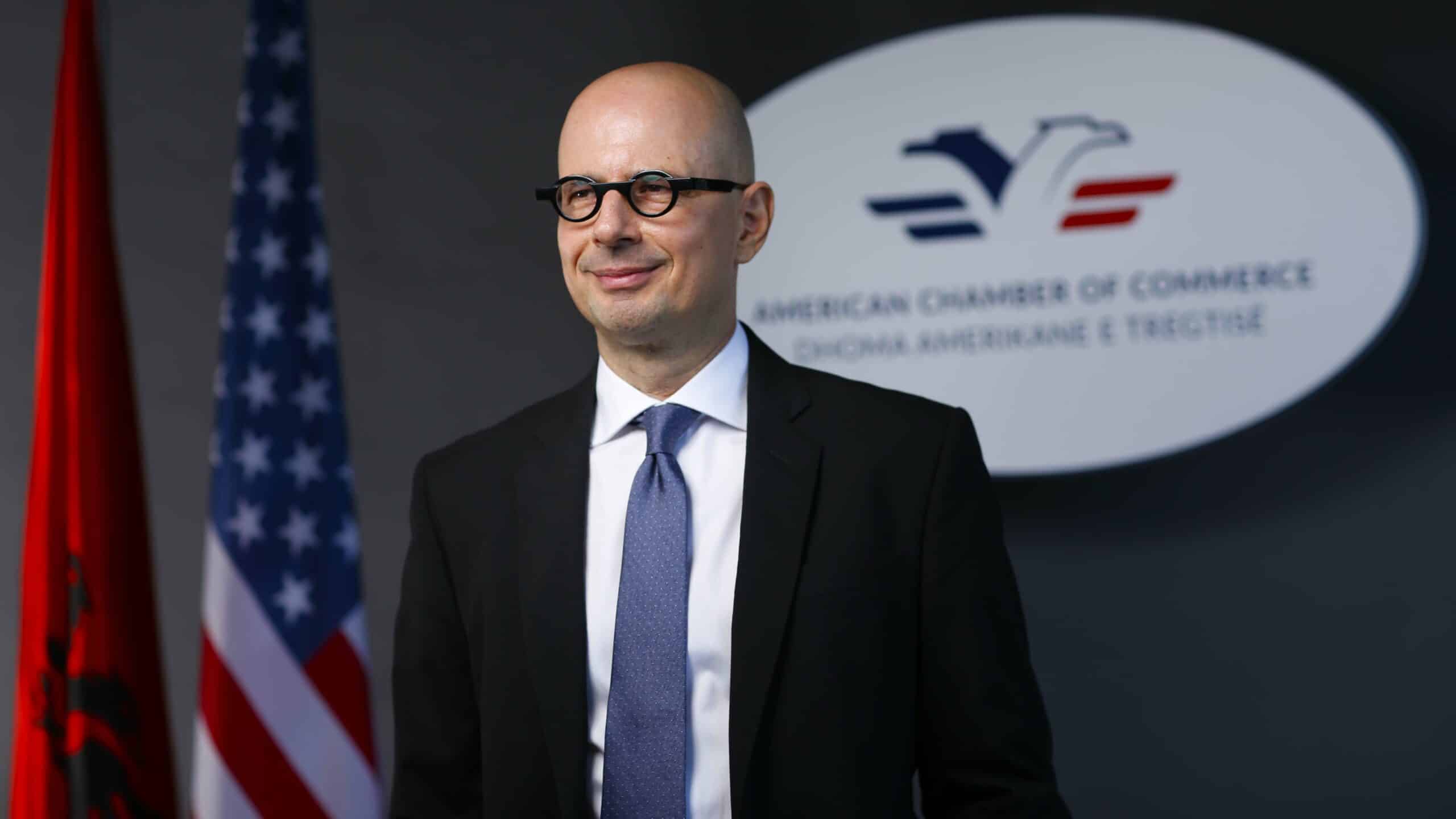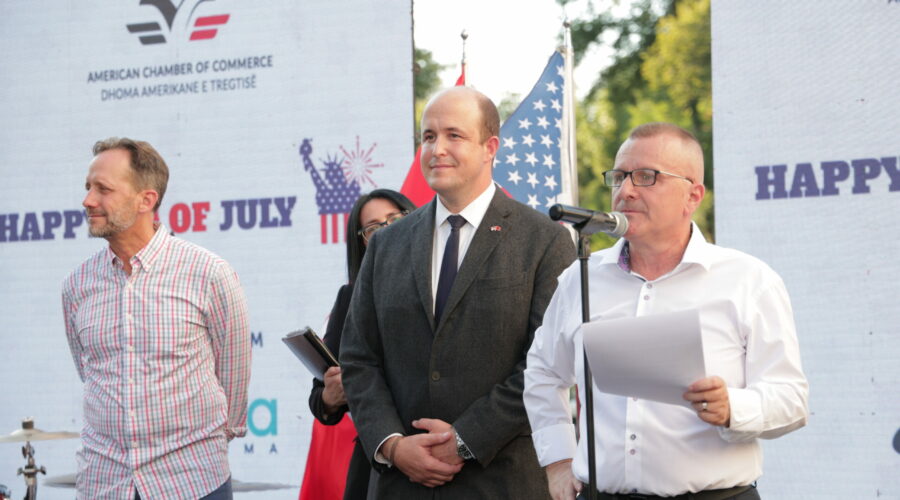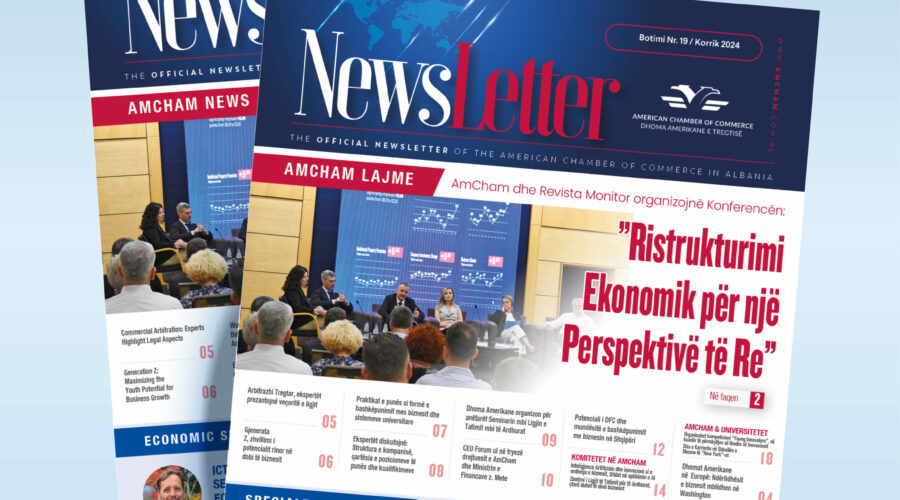“An attractive policy on foreign investments is the key to the transition of the economy from ‘developing’ to ‘competitive’. Albania lacks a strategy to attract FDI. And this has made it lose regional ground to Serbia and North Macedonia,” the head of the American Chamber of Commerce in Albania, Enio Jaço, tells Monitor magazine.
He adds that, for the developing Albanian economy, the corruption issue has turned into a serious chronic disease, seen in injustices and dishonesty experienced by businesses. That has almost turned the country into an unwanted place for investors.
What prompted AmCham’s work on the Investment Agenda?
There are three essential reasons that the Chamber’s stance has changed significantly. First, there is a growing number of ‘incidents’ reported by Chamber members. I am speaking about various problems on the ground, with law implementation and competition in areas where businesses operate.
We have noticed growing complaints about these incidents. Second, the Business Index, the main annual analysis we have, has seen an unusual decline in the last two years. And, third, our analysis has been reaffirmed by international partners. I’d like to mention public and other reports such as those issued by the World Bank, the U.S. State Department, the European Union, etc.
Based on those reasons, we decided to advance our concerns not only in creating awareness, but by offering concrete technical proposals to address the situation. Our technical committees have done some in-depth work for about nine months, and the AmCham Investment Agenda is a product of that work.
You are talking about a new “mindset” on Foreign Direct Investment policies. What does this mean, and how can Albania benefit?
An attractive foreign investments policy is the key to the transition of the economy from “developing” to “competitive.” The history of the world economy is very clear in this regard. Countries that adopt genuine central policies on attracting foreign investments create more prosperity and opportunities for their citizens when compared to countries that do not have investment policies.
Economic well-being translates into economic growth, new jobs and rising incomes. But it is also related to the acquisition of new technologies and the modernization of the capacities of the skilled workforce. For all these reasons, the investment promotion policy is the connecting pillar of all the other recommendations we have.
Does Albania have a strategy to attract Foreign Direct Investment, and how does it compare to other Western Balkan countries?
Recently, Albania has had some FDI achievements, establishing partnerships in the implementation of ambitious projects with serious international companies. Here, I’d like to single out projects like Skavica and the Port of Vlora, involving international conglomerates like Bechtel and Exxon Mobil. These projects, if they progress, will be significant for the Albanian economy and are encouraging.
But these projects are a product of direct government effort at the high level. Although successful initiatives, they can not replace the organic, quality investments produced by the free market, based on clean economic incentives of private entrepreneurs. In this respect, Albania lacks a proper strategy to attract FDI. And this has caused it to lose ground in the region, compared to Serbia and North Macedonia, which have adopted much more aggressive policies toward attracting FDI.
Successful FDI strategies start by determining priority sectors in which the country has available resources and skills above average, and, combined with qualitative and quantitative investments, can create a comparable size in terms of global competition. (I want to emphasize that it is not necessary to be a big country to have competitive sectors).
Second, once the priority sectors are identified, then a transparent public investment plan, in infrastructure, for example, must be in place to precede private investments. Third, it is important to determine the incentives that private companies — be they domestic or foreign — will be offered if they invest. These incentives are related to the size of the investment, the number of new jobs it creates, added income to the economy, taxes, etc. Such a complete picture guarantees the interests of the private sector to invest in public initiatives.
In addition to the strategy, what are the key policy recommendations for attracting these investments?
First, there must be a shortening of lengthy, bureaucratic procedures for investment permits. One of the competitive advantages that Serbia and North Macedonia have in attracting high levels of Foreign Direct Investment is the easy procedures to get investment permits.
Second, it is important to create a progressive incentive package to drive sustainable investment through performance appraisals as well as regulatory, procedural and financial incentives.
Third, it is very important for AmCham and the Albanian market to adopt a policy based on clear rules, which discourage monopolies and market concentration. If the above three criteria start to be applied, the impact would be rapid.
You have spoken publicly about corruption; why is this issue of particular importance to AmCham?
Corrupt practices are one of the most constant concerns of the AmCham community. But corruption is not AmCham’s only concern. On the same subject, the public perception is also at worrying levels. For the developing Albanian economy, the issue of corruption has turned into a serious chronic disease, seen in injustices and dishonesty experienced by businesses. This has almost turned the country into an unwanted place for investors.
The time has come for corruption to be fought with concrete results in all areas where it has branched out, from the lowest level of public administration to the highest levels of government.
Is the fight against corruption the sole responsibility of the government and the justice system? What contributions can be made by the private sector and civil society?
Political will is of paramount importance in the fight against corruption. But civil society and business also have an important role to play. The short history of Albania’s post-communist period has created skepticism, both in the government and the private sector about the possibility of cooperation between the two. AmCham structures around the world look at this differently. Public-private partnership is an important condition in the fight against corruption.
First, the government should consider the private sector as a valuable ally in this regard, providing maximum transparency in public operations. This would increase the government’s credibility in the fight against corruption and private sector cooperation in identifying injustices.
For example, encouraging and (financially) supporting Open Data standards, or similar media, as an internationally established standard in monitoring public operations would be of added value. The growth of e-Albania should not be seen only as a service to citizens (which is obviously valuable), but also as a platform where public documents of public agencies can be accessed. Strengthening such instruments, aimed at transparency, would increase long-term confidence in public procurement management, reduce misinformation and increase contributions by civil society.
In addition to involving civil society, what are your legal recommendations on the fight against corruption?
We suggest two legal interventions. First, an anti-bribery legal package, which sets out the conditions for penalizing and sanctions for corrupt cases of the previous and current governments. The best practices we recommend are compliance with the standards set out in the OECD Anti-Bribery Convention as well as the recommendations of the European Union.
This would significantly narrow the legal space for abuse by mid-level employees of the public administration hierarchy, weaken abusive pressure from corrupt senior officials to mid-level ones, and it will make it easier for judicial bodies to identify injustice.
Equally important to AmCham is the elimination of “Special Exceptions” from the Public Procurement Act, a practice that leaves room for high-risk abuses through passive and active corruption, as well as setting clear conditions for special procurement in cases of strategic importance.
Mr. Jaço, AmCham’s findings show that the current main indicators are the impact of the pandemic and lower progress than expected. How do you think these factors will continue to affect Albania beyond 2021?
I think the challenge is not over and will continue in 2022, but it will be of a different nature. Adapting to the new reality will be the biggest challenge for Albanian businesses in the long run. In a general symbolic perspective, the situation of the businesses and the climate in which they operate is like that ship in the middle of the ocean trying to find the right navigation line between big tides and ebbs. But to do this, it first needs a compass, the strength of cooperation to succeed and the use of the right coordinates.
In that sense, we appreciate the Government’s cooperative approach with AmCham and the business community as well as the potential that Albania has and its opportunity to soon become part of the European Union.
But if the current challenges are not addressed through long-term solutions, Albania’s pace in having a competitive and attractive economy will be insufficient for the current period and will have consequences for the younger generation. We are inclined to believe that Albania has all the opportunities to advance in the regional competition for investments and business development. But I think it is the right time for Albania to start working seriously to become a winner in this competition!
According to concerns by businesses, finding qualified local staff remains a significant challenge. Do you think that this will remain an “Achilles heel” in the Albanian market?
Yes, we anticipate that the issue of qualified human resources will remain challenging for a long time. Some of the reasons are global and not necessarily local. For example, the rapid advancement of technology and changes in working conditions (i.e. during the pandemic) have created a terrain which requires qualifications and other skills from the workforce. But some of the issues are also specific to the local market.
As part of the Investment Agenda, we have dedicated a special chapter to the qualification of the workforce, emphasizing a deeper cooperation between the public administration and the private sector. But overall, I’m optimistic. Albania has extraordinary talents and a young workforce, eager for professional opportunities, which makes it competitive in many respects.




